May, 2024
San Francisco, USA
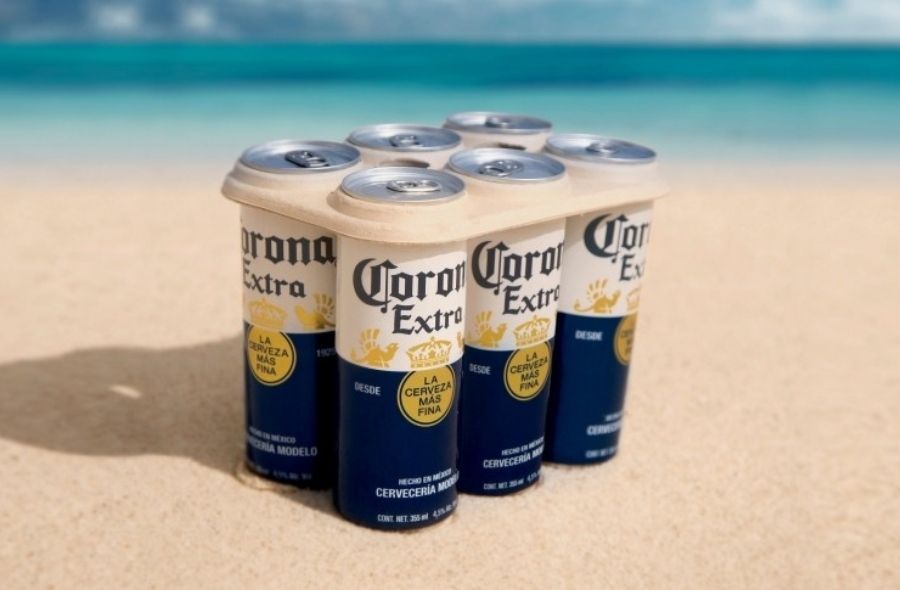
Being a part of the circular economy that is positioned on the strategy of closing the loops or the supposed ecological and economic flow of resources, it becomes essential to integrate sustainable practices at the forefront. According to Global News Wire, the eco-friendly packaging market in the U.S. has been estimated at US$ 42.7 Billion in 2021 and has been globally projected to reach US$ 252.3 Billion by 2026. An eco-friendly packaging simply involves the use of renewable or biodegradable materials that are incapable of causing environmental damage. Within almost every alcohol category including beer, wine, and spirits, sustainability has been fundamentally considered and has been impacting not just packaging but sourcing ingredients and other processes also. Approximately 71% of consumers assert that they are willing to pay extra for sustainable packaging and the percentage rises to 83% when it comes to younger buyers, according to the Global Buying Green Report 2021.
[[relatedPurchasesItems-35]]
The changing regulations, the informed consumers, technological advances, varying purchase behavior, and extreme concerns for the environment. These are some of the crucial factors that have enabled drinks companies to renew their commitments toward sustainability. Refurbishing the drink's packaging can encourage the shrinkage of carbon footprint, increase the recycling of products, and establish a plastic-free environment.
“Spirits have shown remarkable resilience during the pandemic. Consumers want to be seen to be drinking certain brands as it says something about themselves to others and this has become increasingly important in the new Instagram generation.” - Sanjeet Aujla, Equity Analyst at Credit Suisse
According to Trayak, packaging that interacts with the contents and helps in improving the shelf life or quality of the contents is deemed as Active Packaging. There are certain substances released or removed from the packaging. For. e.g. a film packaging with ethylene absorbers. On the other hand, Intelligent Packaging can keep track of the contents and let the consumer be aware of what is happening with the contents. This includes the time of packaging, freshness of the contents, temperature, or other useful information. It is done with the help of sensors added on, chips for certain products, or other LED barcodes. This kind of packaging is a game-changer in the drinks industry and plays a huge role in reducing the impact on the environment. Not only this, but it can also help drinks companies to remain competitive and promote a positive brand image to their consumers. Sustainability has already become a compelling motivator for consumer purchase decisions, and here are some of the sustainable initiatives taken around the drinks industry which are being integrated into their packaging.
The production and shipping of glass bottles are one of the major components of a wine and spirits supply chain that use up a lot of energy and increase the carbon footprint by approximately 51% to 68%. Although being impermeable and fantastic for storing beverages, they require inferno-like heat to make and an immense amount of fuel and packaging to be shipped. However, PET (Polyethylene Terephthalate) is made of 100% recyclable plastic and is clear, strong, and lightweight.
They are at the forefront of the sustainability trend and are one of the easiest plastics to recycle. 87% lighter than glass, Garçon Wines along with Packamama, a packaging company, has launched a flat BPA-free bottle that holds 750 ml of wine and fits 91% more product on a shipping pallet. Hardys, a part of Accolade Wines portfolio, has adopted these bottles to move towards the sustainability alternative. They offer better utilization of space, less loading time, speedier deliveries that add up to savings for wineries, and a 50% reduction in emissions over the glass bottle.
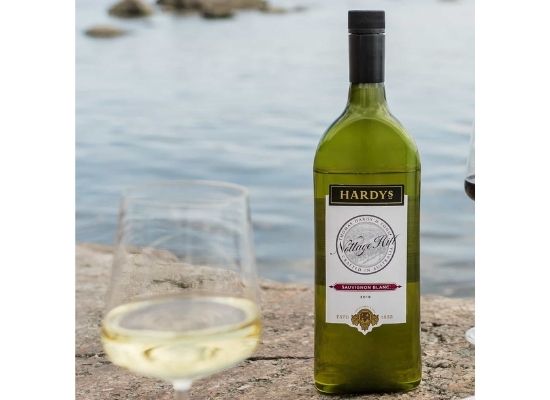
Hardys Nottage Hill Sauvignon Blanc; Image Source - Garcon wines
Using layers of recycled paperboards fused with water-based glue to create a bottle, the cellulose-fiber bottles are 94% chemical-free and 5 times lighter than a glass bottle. It requires less fuel to shop and can survive a 5-foot drop without breaking. Frugalpac, a British-based company has brought a revolution in the bag-in-box wine culture by introducing a Frugal Bottle that is made from 94% recycled paperboard and a food-grade pouch inside that cuts down the carbon footprint on wine and spirits bottles by 84%. Signal 7’s Social Red Argentinian Red Wine comes in a Frugal Bottle packaging.
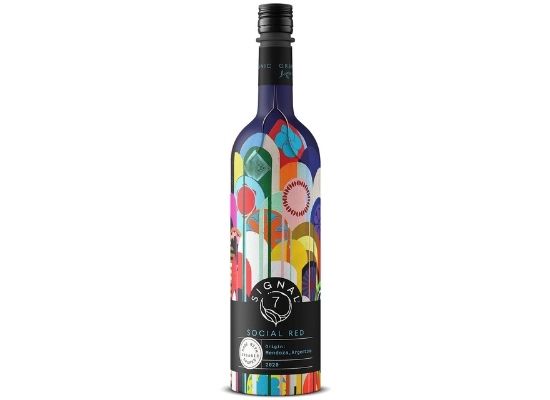
Signal 7’s Social Red Argentinian Red Wine Frugal Bottle Packaging; Image Source - Signal7 wines
A sustainable packaging company, Frugal Bottles was founded by Malcolm Waugh, the CEO of Frugalpac with a global mission to decarbonize the food and drinks industry. The bottle has a carbon footprint of 84% less than that of glass and follows a localized production model. They create and supply recycled paper-based products with the lowest carbon footprint that is easily recycled again.
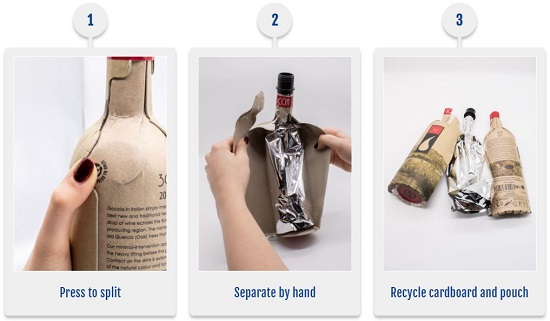
Recycling of a Frugal Bottle; Image Source - Frugalpac
By shrinking the product, the packaging can be downsized which can help in reducing the shipping. An initiative launched by BrewVo, is a sustainable beverage technology that uses a patented brewing process. It reduced the production and distribution of beer by 1/6th of the traditional weight and volume and increased capacity. It produces a Multi-Brewed beer which when blended with water and alcohol, yields a beer that is identical to traditionally produced beer. At that concentration, the beer can be shipped in a small bag-in-box, reconsulted with water, and spiked with grain alcohol. Shades Brewing, one of the craft breweries in Salt Lake City, has adopted this approach and is selling some fantastic beers.
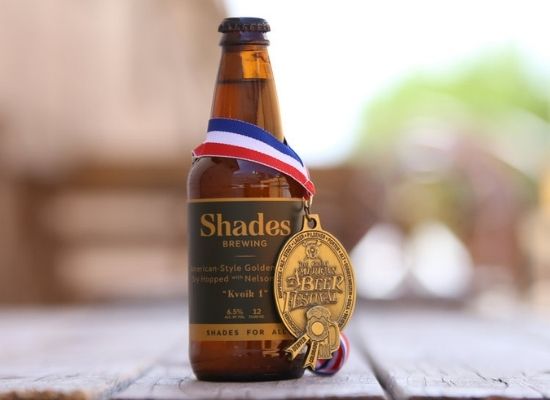
Shades Brewing Beer; Image Source - Shades brewing
Aluminum beverage cans are the most recyclable drinks pack in the world and with an average recycling rate of 69%, they can be endlessly recycled without any loss of quality. The beverage can is already well-positioned in the beverage industry and is a good initiative. Due to their size and weight, they effectively reduce the CO2 emissions during transportation, encourage trials due to their smaller size, and are also a portable alternative for consumers. However, producing aluminum alloy also releases harmful greenhouse gasses into the atmosphere.
A smart alternative to the aluminum can is an initiative by CartoCans which offers a beverage packaging system made of paper. It is 30% more eco-friendly than aluminum or PET and uses 30% less total raw materials that come from renewable resources. It also bears the FSC (Forest Stewardship Council) label. The Pulpoloco Sangria has adopted the CartoCans packaging for their range of sangrias.
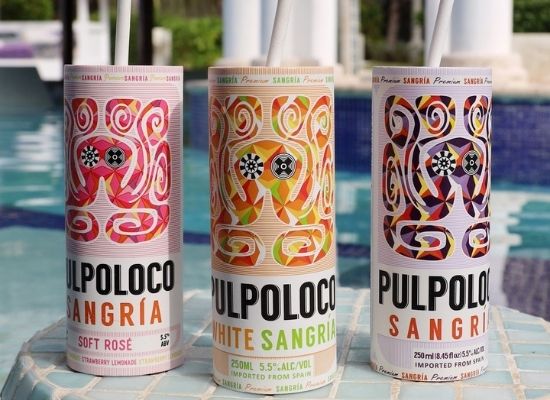
Pulpoloco Sangria packaging; Image Source - @pulpolocosangria on Instagram.com
Replacing plastic rings to hold beer cans with cardboard ones has been a revolution within itself. To eliminate single-use plastic, beer brands are using sustainably sourced, recyclable, and biodegradable cardboard to hold the beer cans together. The new format along with other waste-saving innovations can help in reducing plastic waste globally by more than 1,200 tonnes a year which is equivalent to 60 million plastic bags. Hi-Cone, a US-based company has come up with the sustainable initiative RingCycles that hold 4, 6, or 8 cans of beer together.
It has a 73% environmental impact than the plastic ring holder, is 87% lighter for transportation, and requires 73% less water to be manufactured. Mahou San Miguel beer has already replaced the plastic holder for cans with the Hi-Cone RingCycles. Corona Beer is another one of the beer brand that have launched the cardboard six-pack beer holders.
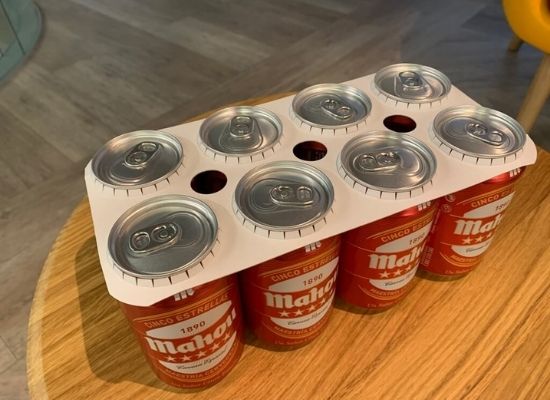
RingCycles holder for Mahou San Miguel Beer; Image Source - Mahou San Miguel
Across the drinks industry, there are numerous initiatives taken to shrink the carbon footprint of wine, spirits, and beers. Beverage industry giants like Diageo, Bacardi, Absolut, and many other brands have taken immense initiatives as well to reduce the impact of their products on the environment. Beverage brands are focusing on providing ‘How to recycle?’ information on their labels to educate the consumers and are also becoming 100% transparent about their carbon footprints.
These small initiatives are not just motivating brands to adopt these alternatives but also making the consumer conscious of their consumption.
Article by Shreya Kohli, Beverage Trade Network
Header Image Source - Six-Pack Beer Can Holder; Image Source - Corona USA